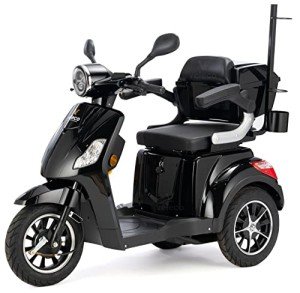Mobility Scooters: A Comprehensive Guide
Mobility scooters have ended up being an important mode of transport for numerous individuals facing mobility obstacles. This post checks out the numerous facets of mobility scooters, including their types, benefits, features, and a guide for potential purchasers.
Comprehending Mobility Scooters
Mobility scooters are electrically powered devices created for people with minimal mobility. They provide a way of transport for people who may have problem walking however still wish to retain their independence. disability scooters come in numerous designs and functions to deal with a wide variety of needs.
Types of Mobility Scooters
Mobility scooters can normally be classified into 3 primary types:
| Type | Description | Best For |
|---|---|---|
| Compact Scooters | These are small and lightweight, ideal for inside your home and short trips. | Users with restricted storage space or those who travel often. |
| Mid-size Scooters | A balance in between portability and stability, ideal for both indoor and outdoor use. | Those who need to cover a range of terrains. |
| Durable Scooters | Big and robust, created for rugged outside usage and heavier individuals. | Users requiring extra weight capability or going off-road. |
Key Features of Mobility Scooters
The option of mobility scooter typically depends upon the functions that align with private needs. Here are a few of the crucial functions to think about:
- Weight Capacity: Mobility scooters include various weight limitations. It is crucial to choose a scooter that can adequately support the user's weight.
- Variety: The range a scooter can travel on a single charge varies. Depending on user requirements, one might decide for scooters with a variety of up to 40 miles.
- Speed: Most mobility scooters can reach speeds between 4 to 8 miles per hour. Consider what speed is comfy and safe for the intended environment.
- Turning Radius: A compact turning radius is vital for indoor use, enabling for easier navigation in tight areas.
- Battery Type: The type of batteries utilized can impact the scooter's efficiency. Lead-acid and lithium-ion batteries are the most common.
Benefits of Using Mobility Scooters
The benefits of mobility scooters extend beyond just transportation. Some crucial benefits consist of:
- Independence: Users can browse their environment without depending on caregivers, promoting independence and self-confidence.
- Health Benefits: Using a scooter can motivate outside activity, causing physical and mental health enhancements by lowering feelings of isolation.
- Convenience: Scooters can easily be run in various environments, whether inside, in shopping center, or outdoors.
Important Considerations When Buying a Mobility Scooter
When purchasing a mobility scooter, a number of factors to consider can assist guarantee that you select the right design:
Assess Individual Needs:
- Mobility level: Consider just how much assistance the person will need.
- Variety of usage: Determine where the scooter will primarily be used (inside your home, outdoors, on rough surfaces, and so on).
Test Drive:
- Always test drive a number of models to find an appropriate fit. Focus on comfort, ease of steering, and the scooter's responsiveness.
Review Safety Features:
- Look for scooters with sufficient security features like lights, indicators, and anti-tip designs.
Check Warranty and Service Options:
- A reputable service warranty and offered service options are crucial for long-lasting use.
Frequently Asked Questions about Mobility Scooters
1. How fast do mobility scooters go?Mobility scooters generally have speeds varying from 4 to 8 miles per hour, with the majority of created for safety instead of high-speed travel. 2. Are there weight restrictions on mobility scooters?Yes, mobility
scooters come with specific weight limitations, typically ranging from
250 lbs to over 500 lbs, depending upon the model. 3. Can mobility scooters be used indoors?Certain designs, particularly compact scooters, are specifically created for
indoor use and are easier to steer in tight spaces. 4. How frequently do the batteries need to be replaced?Battery life can vary based upon usage, however generally, with proper care, batteries might last in between 1 to 3 years before needing replacement
. 5. Are mobility scooters covered by insurance?Coverage can vary, but some insurance plans, consisting of Medicare and Medicaid, might cover part of the cost. It's recommended to consult individual insurance suppliers. Mobility scooters serve as a
valuable tool for numerous people, enabling them to maintain
their freedom and independence. By understanding the different types and features of mobility scooters, people can make informed choices customized to their particular needs.
Whether used for errands, interacting socially, or leisurely activities, mobility scooters can boost the quality of life for those with mobility limitations. Investing in a mobility scooter is a decision that can considerably affect a person's day-to-day life. For that reason, individuals need to thoroughly evaluate their alternatives and choose a model that best aligns with their way of life and mobility requirements
.

